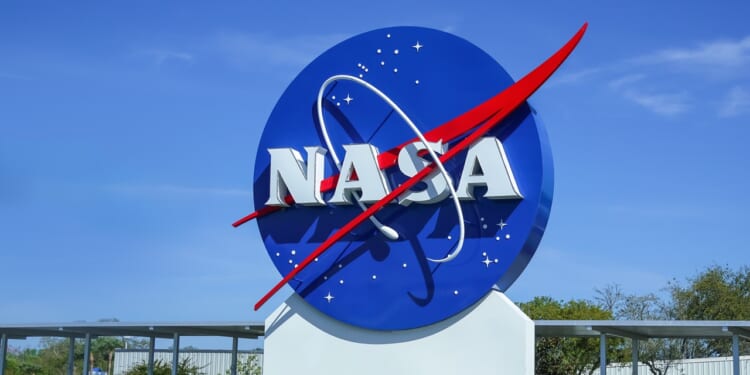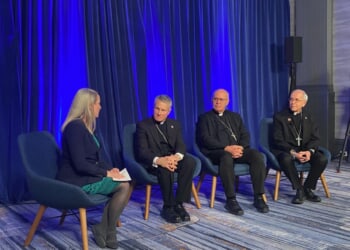Like all bureaucracies in Washington, NASA could use some streamlining—but cutting critical missions runs counter to the Trump administration’s mission to make America’s place in space great again.
The space war is clearly heating up. As China moves to expand its footprint in Earth’s orbit—and beyond—the Americans are feverishly playing catch-up. The Trump administration recently announced it was intent on classifying NASA as an intelligence agency—a claim that went viral on social media over the weekend.
But it’s hardly new. Indeed, during the heady days of the Cold War, NASA was at its core a fighting institution. The moment the Cold War ended, it lost its way.
NASA Is Center Stage in the New Space Race
Now, a new space race is on. And NASA must put on its military and intelligence space helmets again. It may be a little dusty in there, and the visor might be smeared with age. But now is the time.
Indeed, this focus is precisely what Acting NASA Administrator Sean Duffy has called for. Yet the White House is apparently at loggerheads with itself. Even as the Trump administration is reclassifying NASA as an intelligence agency—with future ambitions to match—Congress is fretting over the Office of Management and Budget’s (OMB) proposed cuts, totaling to around $12 billion in prior investments, to NASA funding. These possible cuts to NASA’s overall budget would take effect as early as next month under a Continuing Resolution (CR), a short-term budget agreement to keep the government open.
Why Is the OMB Trying to Cut NASA Funding?
A congressional letter signed by eight Members of Congress is now urging the key leaders of the House Appropriations Committee and its Commerce, Justice, Science, and Related Agencies Subcommittees—including the chairmen and Ranking Members of those important committees—to stop those proposed cuts.
According to the letter, the suggested cuts to NASA’s budget would be highly disruptive to NASA’s overall operation, particularly in space science. As many as 20 missions—including those studying Jupiter, Mars, Neptune, and potentially hazardous asteroids—are expected to be negatively impacted by the OMB’s desired cuts. The letter describes the proposed CR budget as an “unprecedented single-year cut” that ignores ongoing congressional priorities and could have irreversible effects on US space leadership at a critical time for America’s space leadership.
To rectify this, the eight members of Congress opposed to the OMB’s plan are insisting that the House Appropriations Committee include specific language in the CR to protect NASA’s funding. The goal appears to be to essentially create a safe harbor in the CR that would ameliorate the threat of immediate cuts, while Congress deliberates the full budget.
NASA Should Not Lose Capabilities Amid Budget Cuts
Not all the proposed cuts are terrible ideas at first blush. For instance, the OCO-2 (Orbiting Carbon Observatory-2) mission is on the chopping block. That mission set studies global carbon dioxide sources and other elements of climate change—missions that have been overhyped under previous administrations, and that the Trump administration has made clear fall low on its list of priorities.
On the other hand, critics argue the loss of this mission would hamper global emission tracking. Even though anthropogenic climate change is a minimal threat to Americans’ livelihoods, it still costs relatively little to keep tabs on it. OCO-3, which specifically studies carbon dioxide and solar-induced fluorescence from the International Space Station (ISS), would have similarly concerning impacts.
Other programs are far more important. The cancellation of the CYGNSS (Cyclone Global Navigation Satellite System), which is also on the chopping block, would come far closer to home for many Floridians—perhaps including the president himself, whose famed Mar-a-Lago estate lies within a hurricane zone. Canceling CYGNSS would reduce hurricane prediction accuracy, complicating disaster response (which, in a hurricane, is a complicated enough experience). If Trump and Congress are intent on paring down NASA to focus it on its core mission—namely space dominance—a better solution than eliminating programs such as these is transferring them to other parts of the government, such as the National Oceanic and Atmospheric Agency (NOAA).
Then there are the various asteroid monitoring missions and the space weather monitoring missions. These endeavors should not only continue to be funded, but should enjoy significant funding expansions because of their importance to the safety and security of the world.
Naturally, like all bureaucracies in Washington, NASA could use some streamlining in other areas. DEI and global warming pet projects are a great place to start cutting. But cutting critical missions like the ones mentioned above runs counter to what the Trump administration has been trying to do with US space policy since its first term: making America’s place in space great again. Congress is right to fight this.
Congress’ Cuts Will Risk America’s Space Security
NASA’s lost scientific capabilities are only one part of the overall picture. While the manned spaceflight mission will always be the most important element of NASA’s mission—even if NASA has forgotten this in recent years—many of these research missions are important, too. In large part, they support the main mission. And even though one might argue that these missions are not useful from a hard national security perspective, they nonetheless confer a great deal of prestige upon the United States and NASA.
The new space race is here. If trends persist, it will eventually devolve into a real space war between the United States and China. At such a time, NASA will be a frontline warfighting institution. The Trump administration should be enhancing its funding and capabilities, not cutting them. Congress is right to protest the OMB’s proposed cuts.
About the Author: Brandon J. Weichert
Brandon J. Weichert is a senior national security editor at The National Interest. Recently, Weichert became the host of The National Security Hour on America Outloud News and iHeartRadio, where he discusses national security policy every Wednesday at 8pm Eastern. He is also a contributor at Popular Mechanics and has consulted regularly with various government institutions and private organizations on geopolitical issues. Weichert’s writings have appeared in multiple publications, including The Washington Times, National Review, The American Spectator, MSN, The Asia Times, and others. His books include Winning Space: How America Remains a Superpower, Biohacked: China’s Race to Control Life, and The Shadow War: Iran’s Quest for Supremacy. His newest book, A Disaster of Our Own Making: How the West Lost Ukraine is available for purchase wherever books are sold. He can be followed via Twitter @WeTheBrandon.
Image: Shutterstock / SNEHIT PHOTO.


















